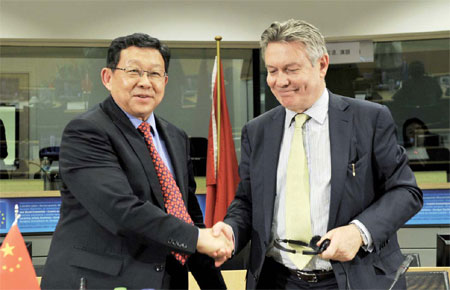China is on outside looking in
Updated: 2013-03-22 07:10
By Yang Yang, Ding Qingfen in Beijing, Zhang Chunyan in London Yu Wei in San Francisco, and Liu Jia in Brussels(China Daily)
|
||||||||
|
Then Chinese commerce minister Chen Deming shakes hands with EU Trade Commissioner Karel De Gucht ahead of the 26th EU-China Economic and Trade Joint Committee meeting in Brussels last year. Provided to China Daily |
But Beijing is keen to start trade talks with EU, and is set to talk with Japan and South korea
As the European Union and the US prepare for talks on a free-trade agreement, China has made it clear that it will not sit idly by and be left on the outside.
The European Commission President, Jose Manuel Barroso, has said an agreement between the EU and the US will be a "game-changer" for world trade, and now China is getting in on the act by trying to start free-trade talks with the EU.
Wu Hailong, China's ambassador to the EU, says his country has sent a proposal to the EU on talks about a feasibility study and is waiting for a reply.
"But as far as I know, the EU is not that active on the matter, partly because the talks with China would be much harder, and partly because the EU is in talks with the US and is considering talks with Japan."
The Commerce Ministry announced on March 19 that a meeting between China, Japan and South Korea would be held in Seoul on March 26 "to hammer out a tripartite free-trade agreement".
At the moment China and the EU are each other's largest trading partners and China and the US are each other's second largest trading partners.
Bart Kerremans, professor of international political economy and American politics at the University of Leuven in Belgium, says that while the EU-US talks will not greatly affect EU-China ties, "at least not in the short run", the significance of the talks goes beyond trade itself to new trade rules that will be created and whose impact will be long felt.
There is a long history of the US and the EU more or less determining what happens in the multilateral trading system, Kerremans says.
"Many countries are suspicious about the fact that rules set bilaterally by the EU and the US could be forced upon the rest of the World Trade Organization in the future. Or the US and the EU could at least try to do so. Especially developing and emerging economies are suspicious here, and rightly so."
John Clancy, the EU trade spokesman, said that besides creating new regulations, "we will also aim at jointly promoting rules and standards that could be applied at the global level".
Fredrik Erikson, director of the European Centre for International Political Economy in Brussels, says the new rules will pose risks for China when other countries enter into trade pacts to which China is not a signatory, such as imposing stricter rules on subsidies, state-owned enterprises, public procurement, regulatory transparency and excessive non-tariff barriers.
As China continues to move upward in the global value chain, in the long run its export structure is certain to change.
Kerremans says: "At that point it will be difficult for the Chinese to change the standards and norms that the EU and the US eventually set in their agreement and that they will actively seek to apply to other promising export markets. More fundamental for China are the agreements that the EU has negotiated with South Korea, and is about to negotiate with Japan or is negotiating with other economies in the East Asian and South Asian region."
Zhao Zhongxiu, dean of the School of International Trade and Economics at University of International Business and Economics in Beijing, says that "if the multilateral system is changed due to the transatlantic talks, we will have to accept it".
China already has free-trade agreements with 15 countries, and negotiations are under way for 13 others, including with Japan, South Korea, Iceland and Switzerland, the Ministry of Commerce says.
An analysis published by the European Institute for Asian Studies says officials in Washington and Brussels have acknowledged that the "growing economic might of China" has given "added incentive" to EU-US talks.
"They said that the trade agreement would provide a more united front against Chinese standards and norms in areas such as product safety or intellectual property," the institute analysis says.
Chen Xin, director of the Economics Office of the Institute of European Studies of the Chinese Academy of Social Sciences, says the EU and the US "say that through a free-trade agreement they want to confront the challenges of the emerging economies, but everything points to China".
In 2011 the EU and the US set up a group to discuss the prospect of a free-trade agreement. Its report last June said the talks should seek to conclude a proposal for a transatlantic agreement that goes beyond tariffs, including provisions on intellectual property, services, investment, procurement, regulatory issues and non-tariff barriers.
The European Commission says the EU and US economies account for nearly half of world GDP and for nearly one third of world trade flows. Total US investment in the EU is three times higher than in all of Asia. EU investment in the US is about eight times the amount of EU investment in India and China combined. If an EU-US free-trade agreement were to become a reality it would eclipse all others.
The European Commission President Jose Manuel Barroso has estimated that a "comprehensive and ambitious agreement" would increase GDP growth by 0.5 percent. Last month he announced plans to seek a deal, a day after US President Barack Obama gave US support in his State of the Union address, saying a free-trade deal would "boost American exports, support American jobs and level the playing field in the growing markets of Asia".
Erikson says the biggest barriers for the deal are in areas of non-tariff barriers and regulatory convergence, including politically sensitive areas such as regulations on agricultural goods, public procurement and the regulation of cross-border data flow.
Despite talk about an EU-US deal changing trade rules, there are those who are sanguine about what negotiations would mean for China.
"China needn't worry much about the EU and the US on this," says Wan Jifei, chairman of the China Council for the Promotion of International Trade.
"It's their own business, and whether and when the pact is wrapped up, there are still a lot of questions."
Some experts say that the impact on China's trade with the EU and the US would in fact be slight.
Zhao at the University of International Business and Economics in Beijing, says: "On the value chain, the EU and the US occupy the highest 15 percent, and China is getting rid of the lowest 15 percent characterized by intensive labor and resources, so for the middle 70 percent there is a lot of room for growth."
The biggest volume of Chinese trade with the EU and the US is in areas such as retail consumer goods and electronics, which will not be directly affected by any changes that arise.
Tyson Barker, director for transatlantic relations at the Bertelsmann Foundation in Washington, says: "Rather its immediate impact will be to augment trade in goods, services and investment in areas the US and EU already dominate like auto manufacturing, sophisticated machinery, chemicals and services."
However, trade in services between the EU and China is much smaller than that between EU and the US, as is the intra-industry trade and investment relationship, says the US Chamber of Commerce Europe Office.
As a result, "China should not worry too much about trade diversion. Instead, China may be missing out on additional trade that is generated by these agreements," says Devin Stewart, senior program director and senior fellow at the Carnegie Council for Ethics in International Affairs.
Zhao says that "for China, we should look at how the Doha round can be pushed forward".
Over the past two months there have been new signals about the Doha talks, Chen Deming, who was until recently China's commerce minister, said at a news conference.
"All member nations concerned are considering launching an early harvest program" by the end of this year, and "China is glad to see and advance the proposal", Chen said.
Meanwhile, China has a lot of room to grow its foreign trade through developing regional and bilateral pacts, Wan Jifei says.
"China could continue to accelerate the negotiation of free-trade agreements with countries such as Costa Rica and Australia.
Zhao says: "The EU and the US have extended the definition of trade so as to control China's growth. We cannot ignore them. Instead, we should consider changing our policies, including industrial policy, trade policy and competition policy to meet the new standards. I think we should proactively take part in the process.
"However, for some issues that violate our economic sovereignty, we should take the problems to the United Nations, such as the security investigation the US conducted on Huawei and ZTE, the two big telecommunications companies."
The BBC has reported that the most optimistic timeframe given by European officials for an EU-US deal is two years, but that consideration is based, among other things, on the presidency of Barroso, whose term expires in October next year.
Contact the writers through yangyangs@chinadaily.com.cn
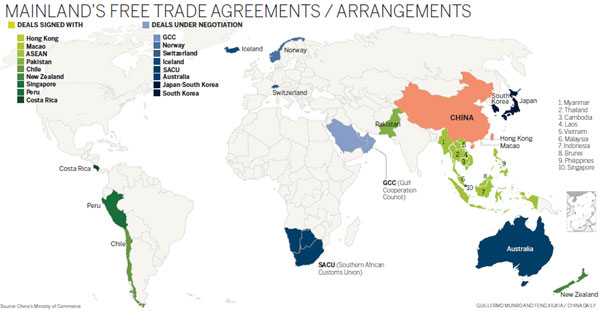
(China Daily 03/22/2013 page12)
- Fireworks sales fall before Lunar New Year
- Mountain 'Spiderman' collects garbage at a cliff
- Infographic: Xi's nationwide journey against poverty
- Train tickets to Hainan hardest to purchase
- Outbound travel market far from mature, claims report
- Prone cycling enthusiast wants more to get out of the saddle
- Fog descends across London, forces flights cancellations
- German chancellor attends carnival reception
- Signs of solutions loom in Syria with int'l approach in Astana
- Europe's nationalist leaders kick off year of election hopes
- Theresa May tries to dispel Brexit worries at Davos forum
- Gambians, tourists flee on eve of deadline for leader to surrender power

 People across China greet upcoming Spring Festival
People across China greet upcoming Spring Festival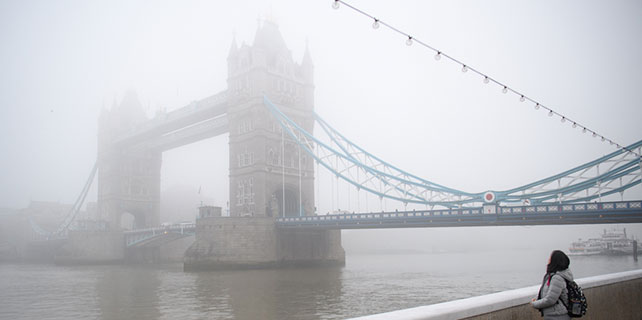
 Fog descends across London, forces flights cancellations
Fog descends across London, forces flights cancellations
 Top 10 best-selling car models in China
Top 10 best-selling car models in China
 Chinese youth: Learning by helping
Chinese youth: Learning by helping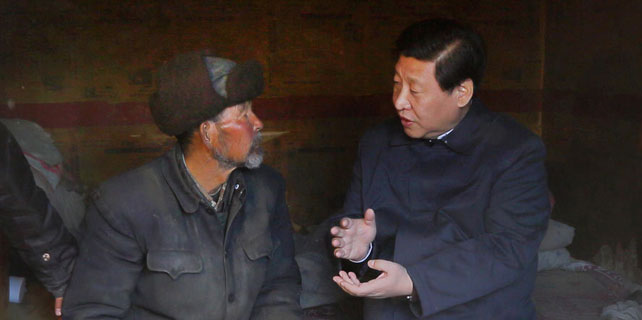
 Xi's inspection tours ahead of Spring Festival
Xi's inspection tours ahead of Spring Festival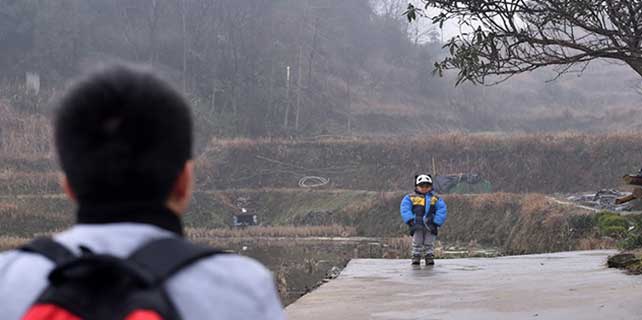
 The moment migrant worker met son after 24-hour journey
The moment migrant worker met son after 24-hour journey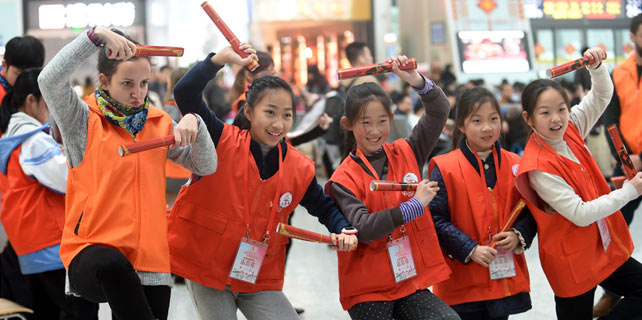
 Offering holiday cheer during train station travel rush
Offering holiday cheer during train station travel rush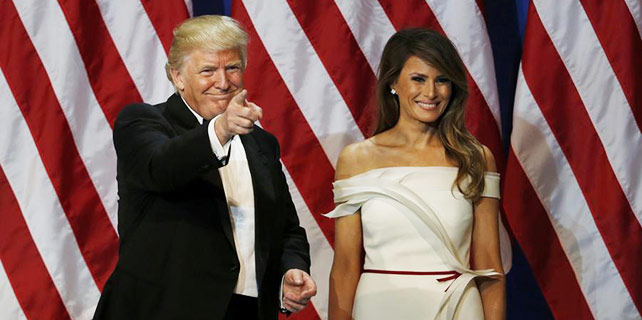
 Donald Trump's first weekend as US president
Donald Trump's first weekend as US president
Most Viewed
Editor's Picks

|
|
|
|
|
|
Today's Top News
China, Allies ponder US role after TPP withdrawal
Petition push on Nanjing bill
For one day, London's smog quotient was greater than Beijing's
China persists with other FTAs after US leaves TPP
Foxconn CEO met with official in Pennsylvania
Cui: China doesn't want a trade war
Trump moving forward with border wall, weighs refugee cuts
Mainland investors snap up overseas real estate
US Weekly

|

|
